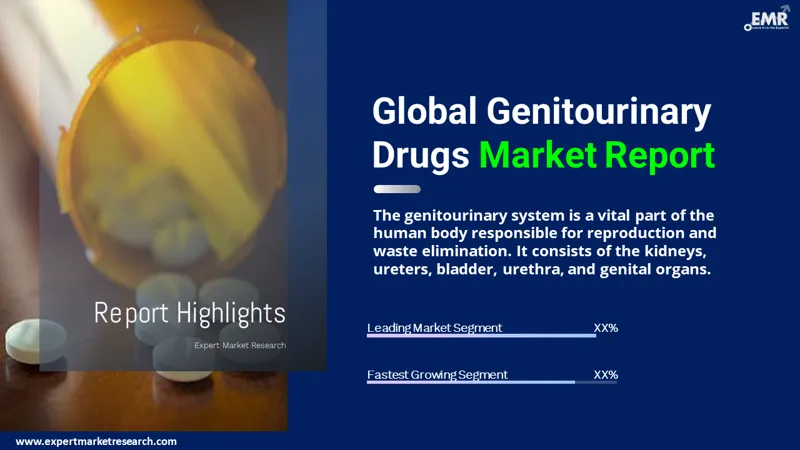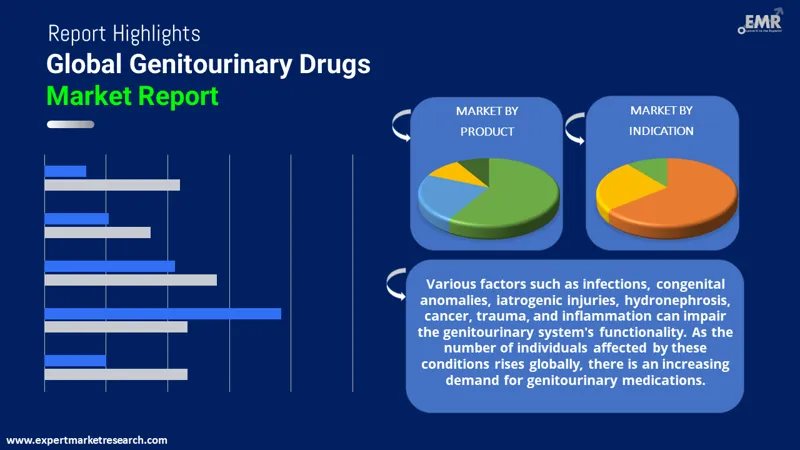
Consumer Insights
Uncover trends and behaviors shaping consumer choices today
Procurement Insights
Optimize your sourcing strategy with key market data
Industry Stats
Stay ahead with the latest trends and market analysis.
The global genitourinary drugs market reached a value of USD 49.96 Billion in 2025, driven by the increasing prevalence of urinary tract infections across the globe. The market size is anticipated to grow at a CAGR of 3.10% during the forecast period of 2026-2035 to achieve a value of USD 67.80 Billion by 2035.
Base Year
Historical Period
Forecast Period
Compound Annual Growth Rate
3.1%
Value in USD Billion
2026-2035
*this image is indicative*
The genitourinary system comprises of the kidneys, ureter, bladder, urethra, and genital organs which are crucial for reproduction and eliminating waste from the body. The system’s functionality can be impaired by congenital anomalies, infections, iatrogenic injuries, hydronephrosis, cancer, trauma, and inflammation. Globally, there is a surge in demand for genitourinary medications as a result of the increasing number of people who have these conditions. Genitourinary medications are prescribed to treat disorders of the urinary tract, reproductive organs, and excretory system.

Read more about this report - REQUEST FREE SAMPLE COPY IN PDF
The EMR’s report titled “Genitourinary Drugs Market Report and Forecast 2026-2035" offers a detailed analysis of the market based on the following segments:
Market Breakup by Indication
Market Breakup by Drug Type
Market Breakup by Route of Administration
Market Breakup by Distribution Channel
Market Breakup by Region

Read more about this report - REQUEST FREE SAMPLE COPY IN PDF
Prostate cancer is anticipated to account for a leading share of the market for genitourinary drugs. This can be attributed to its wide prevalence, and the vast spectrum of treatments used to treat prostate cancer, including immunotherapy drugs, radiopharmaceuticals, and anti-neoplastic medicines.
The major causes of prostate cancer include an ageing population, obesity, diet, and family history. The genitourinary drugs market supports improved survival rates, slowed disease progression, and minimal side effects. Furthermore, it is projected that invasive operations won't be necessary in the future due to the developments in formulation techniques and next-generation therapies.
The genitourinary drugs market growth is predicted to be dominated by North America because of the region's expanding health care infrastructure, rising awareness of genitourinary problems, and rising need for better therapies and treatments for genitourinary diseases. During the course of the forecast period, the market expansion is anticipated to be fuelled by the rising prevalence of erectile dysfunction or ED in the United States.
During the projected period, the Asia Pacific market for genitourinary drugs is anticipated to expand at a profitable rate, fuelled by rising awareness in economies like China and India. The significant investments in research and development by major players and persistent efforts to market branded treatments at affordable prices are the driving forces for the market in the region. Rising disposable income will further increases the likelihood of using branded drugs, and ongoing improvements in healthcare infrastructure are also expected to support the market growth in the Asia Pacific.
The comprehensive EMR report provides an in-depth assessment of the market based on the Porter's five forces model along with giving a SWOT analysis. The report gives a detailed analysis of the following key players in the global genitourinary drugs market, covering their competitive landscape and latest developments like mergers, acquisitions, investments, and expansion plans.
Bristol-Myers Squibb Company, a multinational biopharmaceutical firm with headquarters in New York in the United States researches, develops, and distributes cutting-edge medications that aid patients in overcoming life-threatening illnesses. As part of its dedication to patient care, Bristol Myers Squibb works tirelessly to improve the quality of life for cancer patients as well as to define the future of cancer treatment. The business is renowned for its work in biological and pharmaceutical research.
Novartis AG, a Swiss corporation, is among the biggest producers of medications worldwide. Two significant Swiss pharmaceutical firms, Ciba-Geigy AG and Sandoz AG, combined to form Novartis in 1997. It offers medications for the treatment of infections, immunological disorders, ophthalmic and respiratory illnesses, cancer, cardiovascular diseases, dermatological issues, neurological disorders, and cancer.
F. Hoffmann-La Roche Ltd, a biotechnology business, with headquarters in Switzerland, creates medications and diagnostics to treat serious illnesses. It offers medications to treat conditions like cancer, autoimmune diseases, issues with central nervous systems, eye and vision problems, infectious diseases, and respiratory illnesses. Roche conducts research to find fresh approaches to preventing, diagnosing, and treating illnesses.
*Please note that this is only a partial list; the complete list of key players is available in the full report. Additionally, the list of key players can be customized to better suit your needs.*
Other market players include Genentech, Inc. and Pfizer Inc., among others.




*While we strive to always give you current and accurate information, the numbers depicted on the website are indicative and may differ from the actual numbers in the main report. At Expert Market Research, we aim to bring you the latest insights and trends in the market. Using our analyses and forecasts, stakeholders can understand the market dynamics, navigate challenges, and capitalize on opportunities to make data-driven strategic decisions.*
Get in touch with us for a customized solution tailored to your unique requirements and save upto 35%!
In 2025, the global market of genitourinary drugs attained a value of USD 49.96 Billion.
The market is anticipated to grow at a CAGR of 3.10% during the forecast period of 2026-2035 to reach a value of USD 67.80 Billion by 2035.
The major drivers of the genitourinary drugs market include rising frequency of genitourinary illnesses, improvements in the healthcare infrastructure, and increasing awareness about genitourinary disorders.
Increasing funding for research and development, rise in the number of pipeline drugs in late-stage clinical trials, and launch of next-generation therapeutics are the key industry trends propelling the growth of the market.
The major players in the industry are Bristol-Myers Squibb Company, Novartis AG, F. Hoffmann-La Roche Ltd, Genentech, Inc., and Pfizer Inc., among others.
Genitourinary drugs are used to treat infections to the genitourinary tract, congenital abnormalities, trauma, cancer, inflammation, iatrogenic injuries, and other ailments that cause damage to genitourinary organs.
The various genitourinary drug products are urologicals, hormonal therapy drugs, anti-infectives, and gynaecological, among others.
All organs involved in reproduction as well as those involved in urine production and excretion make up the genitourinary system, for example, fallopian tubes, kidneys, prostate, and bladder.
Explore our key highlights of the report and gain a concise overview of key findings, trends, and actionable insights that will empower your strategic decisions.
| REPORT FEATURES | DETAILS |
| Base Year | 2025 |
| Historical Period | 2019-2025 |
| Forecast Period | 2026-2035 |
| Scope of the Report |
Historical and Forecast Trends, Industry Drivers and Constraints, Historical and Forecast Market Analysis by Segment:
|
| Breakup by Indication |
|
| Breakup by Drug Type |
|
| Breakup by Route of Administration |
|
| Breakup by Distribution Channel |
|
| Breakup by Region |
|
| Market Dynamics |
|
| Supplier Landscape |
|
| Companies Covered |
|
Datasheet
One User
USD 3,299
USD 2,969
tax inclusive*
Single User License
One User
USD 5,499
USD 4,949
tax inclusive*
Five User License
Five User
USD 6,999
USD 5,949
tax inclusive*
Corporate License
Unlimited Users
USD 8,199
USD 6,969
tax inclusive*
*Please note that the prices mentioned below are starting prices for each bundle type. Kindly contact our team for further details.*
Flash Bundle
Small Business Bundle
Growth Bundle
Enterprise Bundle
*Please note that the prices mentioned below are starting prices for each bundle type. Kindly contact our team for further details.*
Flash Bundle
Number of Reports: 3
20%
tax inclusive*
Small Business Bundle
Number of Reports: 5
25%
tax inclusive*
Growth Bundle
Number of Reports: 8
30%
tax inclusive*
Enterprise Bundle
Number of Reports: 10
35%
tax inclusive*
How To Order

Select License Type
Choose the right license for your needs and access rights.

Click on ‘Buy Now’
Add the report to your cart with one click and proceed to register.

Select Mode of Payment
Choose a payment option for a secure checkout. You will be redirected accordingly.
Strategic Solutions for Informed Decision-Making
Gain insights to stay ahead and seize opportunities.

Get insights & trends for a competitive edge.

Track prices with detailed trend reports.

Analyse trade data for supply chain insights.

Leverage cost reports for smart savings

Enhance supply chain with partnerships.

Connect For More Information
Our expert team of analysts will offer full support and resolve any queries regarding the report, before and after the purchase.
Our expert team of analysts will offer full support and resolve any queries regarding the report, before and after the purchase.
We employ meticulous research methods, blending advanced analytics and expert insights to deliver accurate, actionable industry intelligence, staying ahead of competitors.
Our skilled analysts offer unparalleled competitive advantage with detailed insights on current and emerging markets, ensuring your strategic edge.
We offer an in-depth yet simplified presentation of industry insights and analysis to meet your specific requirements effectively.
Share